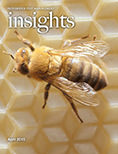Ithaca, New York, USA
April 22, 2015
April 2015 issue
 Contents:
Contents:
The Pollinator Puzzle - IPM Experts Seek Keys to Honey Bee Health
In 2006, managed honey bee colonies began to die off in large numbers without explanation. Scientists believe this problem may be caused by multiple factors, including disease, nutrition, genetics, parasites, pesticides, and other environmental stresses.
Pollinators in Resources Database
The Northeastern IPM Center’s Resources Database lets you search the category “pollinator.”
IPM and Pollinators - Coordinated Action
Government sponsors are coordinating the actions of researchers, educators, beekeepers, and growers in the field in ways that could help reverse pollinator decline.
Perspectives on the Pollinator Issue
The Northeastern IPM Center provides the following synopsis of two prevailing views on neonicotinoids and pollinators. Our goal is to bring this scientific discussion to your attention, not necessarily to promote either view.
New England Bees Have New Ally
A group of professionals are protecting existing bee habitat on farms, open land, and in natural areas.
Resources on IPM and Pollinators
Resources from the April 2015 special issue of IPM Insights, all about pollinators.
Pollinator Losses in the Northeastern United States
One in every three bites of food is attributable to insect pollination. With insect pollinators so vital to food production, national and global reports of their decline are concerning.